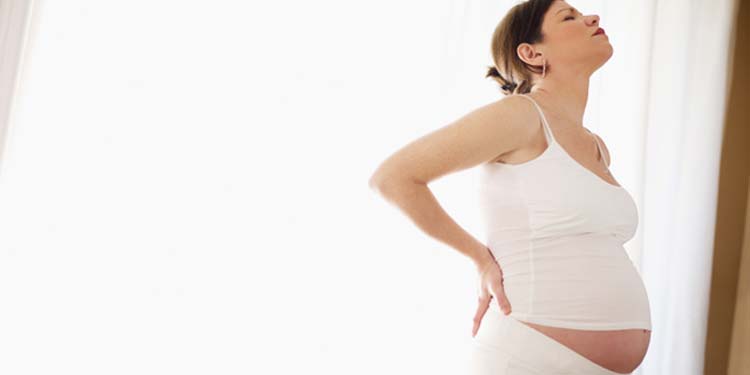
Is back pain normal during pregnancy?
Backache is one of the most common pregnancy problems, especially in the later months. The pain usually goes away after the baby is born. But for many women, back pain lingers for months after giving birth.
What causes back pain during pregnancy?
You can blame your growing uterus for your aching back. Your expanding uterus shifts your center of gravity and stretches out and weakens your abdominal muscles. This changes your posture and puts a strain on your back. Plus, the extra weight you’re carrying means more work for your muscles and increased stress on your joints. This is why your back may feel worse at the end of the day.
What role do the abdominal muscles play in back pain?
The abdominal muscles support the spine and play an important role in the health of the back. During pregnancy, these muscles stretch and weaken. These changes also can increase your risk of hurting your back during exercise.
Do hormones contribute to back pain?
Yes, pregnancy hormones can contribute to back pain. To prepare for the passage of the baby through the birth canal, a hormone relaxes the ligaments in the joints of your pelvis to make them more flexible. Back pain can occur if the joints become too flexible.
What can I do to prevent or ease back pain during pregnancy?
There are several things you can do to prevent or ease back pain. For example, wear supportive clothing and shoes. Pay attention to your position when sitting, sleeping, and lifting things. If you need to stand for a long time, rest one foot on a stool or a box to take the strain off your back. You also can use heat or cold to soothe sore muscles.
What can I wear to support my back?
Look for an abdominal support garment (for sale in maternity stores and catalogs). It looks like a girdle and helps take the weight of your belly off your back muscles. Also, some maternity pants come with a wide elastic band that fits under the curve of your belly to help support its weight.
What shoes should I wear during pregnancy?
Wear low-heeled (but not flat) shoes with good arch support, such as walking shoes or athletic shoes. Avoid high heels—they tilt your body forward and strain your lower back muscles.
What can I do for support when sitting?
Sit in chairs with good back support or tuck a small pillow behind your lower back. Lumbar supports, special devices that support the lower back, are sold at office supply and medical supply stores.
How can I lift things safely?
If you must lift something, squat down, bend your knees, and keep your back straight. Do not bend at the waist to pick up things.
What can I do during sleep to better support my back?
Sleeping on your side is best later in pregnancy. Keep one or both knees bent. It also may help to place a pillow between your knees and another under your belly. You also can try a full-length body pillow.
How can I use heat or cold safely?
You can use a heating pad or warm water bottle for painful back muscles. Heating pads should be set at the lowest possible temperature setting. Wrap your heating pad or warm water bottle in a towel to help prevent burns. Cold compresses also can help ease pain. Limit the time you use heat or cold.
When should I call my health care professional?
If you have severe back pain, or if the pain goes on for more than two weeks, call your obstetrician–gynecologist (ob-gyn) or other obstetric care provider. He or she will want to rule out other causes of the pain.
What health conditions can cause back pain?
Back pain can be a sign of some pregnancy complications. For example, back pain can be a symptom of preterm labor. Pain also can be a sign of a urinary tract infection (UTI). Contact your ob-gyn or other obstetric care provider if, in addition to back pain, you:
- have a fever
- feel burning during urination
- have vaginal bleeding
What if the back pain is not caused by an infection or preterm labor?
Once other causes for your pain are ruled out, your ob-gyn or other obstetric care provider may recommend that you see a rehabilitation specialist or a physical therapist. He or she also may recommend a maternity girdle or brace if you aren’t already using one.
Can exercise help with back pain?
Yes, exercises for the back can:
- Strengthen and stretch the muscles that support your back and legs
- Promote good posture
- Keep the muscles of the back, abdomen, hips, and upper body strong
- Help ease back pain
- Help prepare you for labor and childbirth
- Before doing any exercises, talk with your ob-gyn or another obstetric care provider to make sure they are safe for you. Exercising should not cause pain. If you have pain, stop doing the exercise. See Exercise During Pregnancy for more exercise tips.
Is it okay to walk during pregnancy?
Yes. Walking generally is safe during pregnancy and is great for the back. Wear walking shoes or tennis shoes that fit well and give good support, flexibility, and cushioning.
Is swimming a safe form of exercise?
Water exercise can be especially helpful for back pain. The water supports your weight so you avoid injury and muscle strain. Many women swim right up to the end of their pregnancies.
What about other types of exercise?
If you have no complications that prevent you from doing so, staying active during pregnancy reduces back pain and increases your ability to go about your daily activities. Always talk with your ob-gyn or other obstetric care provider before starting or changing an exercise program during pregnancy
